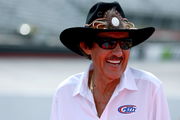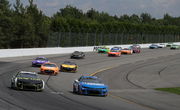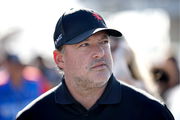
USA Today via Reuters
Mar 10, 2024; Avondale, Arizona, USA; NASCAR Cup Series driver Ty Gibbs (54) leads the field for the restart of the Shriners Children’s 500 at Phoenix Raceway. Mandatory Credit: Gary A. Vasquez-USA TODAY Sports

USA Today via Reuters
Mar 10, 2024; Avondale, Arizona, USA; NASCAR Cup Series driver Ty Gibbs (54) leads the field for the restart of the Shriners Children’s 500 at Phoenix Raceway. Mandatory Credit: Gary A. Vasquez-USA TODAY Sports
While all we get to see is the intense racing on the track and the hard work our favorite drivers are putting in, a lot of work goes unnoticed behind the scenes. Before a NASCAR team comes down to the racetrack, a lot of things have to be taken care of. One of them is the constant analysis of the weather forecast.
And it’s not just about whether it would rain or not; yes, that becomes a crucial factor in deciding the pitting strategy. But the teams even have to monitor if the temperature would be cold, hot, dry, or humid, based on which a car is fine-tuned to give optimal performance in those particular weather conditions. It’s truly a lot more work than what meets the eye. Recently, an RFK engineer deep-divided in the team’s pre-race, weather prep.
ADVERTISEMENT
Article continues below this ad
RFK Racing explains how teams ‘weather’ any weather conditions
Even slight weather changes can have drastic impacts on races. Hence, teams have to be prepared for anything and everything. Like, cold temperatures on race tracks are associated with engines upping the horsepower and dropping fuel usage. This is because the cold, dense air increases the engine’s efficiency. Or, on the contrary, hot days on tracks lead to increased grip and handling, but that increases the tire wear. Higher temperatures can also decrease the horsepower.
Various factors, including wind direction and speed, can influence a car’s balance on the track. Additionally, environmental conditions like cloud cover and the potential for inclement weather can significantly impact the strategic decisions made by pit crews. Recently, RFK Racing in an Instagram video talked about the preparation that goes on. In the video, Chris Buescher’s Vehicle Dynamics Engineer, Andrew Kluckhuhn, said, “We start Monday or Tuesday looking at the upcoming weekend’s weather forecast. Once we know the ambient weather conditions that’s going to be at the race track we know the cooling potentially we’ll need to keep the engine, brakes, and the transmission operational.”
According to Kluckhuhn, the car is fine-tuned based on the findings of the forecast. Dwelling on the details, he said, “We have plates that control the amount of air that goes through the radiator it’s a trade-off for downforce vs cooling potential. These are holes in the nose that run to the brakes. Based on the type of race track we’ll be going to the amount of cooling potential that we need for the brake. Well, add tape to tune the brake temperature for the specific range that it takes for the brakes to operate efficiently. To let air in the rear brakes and transmission. This here is a tape that we use to control the amount of airflow going to the transaxle and the rear brakes.”
View this post on Instagram
As we previously discussed, cooler and hotter temperatures affect the races. Teams have to monitor the particular day’s temperature drop as the race transitions from evening to night. And that can have a significant impact on race results.” A lot of these races will transition from day to night and will have a large swing in lap time. produces more grip and normally faster lap times as the track cools off. For example, at Darlington, the track temperature this year was 110 degrees at start to 80 degrees in racing. Temperature swings like this can translate to half-second lap time gains. In addition to ambient temperature changes, severe weather can affect a race’s outcome.”
What’s your perspective on:
Does weather forecasting make or break a NASCAR race? How crucial is it for team strategies?
Have an interesting take?
Other than minor temperature drops, large storms too can have a significant impact. For example, if there is a hurricane in the region close to the track, the wind will change; hence, again, the car would have to be fine-tuned for that.
ADVERTISEMENT
Article continues below this ad
Trending
How can large environmental factors affect a race?
Andrew Kluckhuhn further in the conversation said, “Understanding the scope of the storm can be the difference between winning the 2016 Pocono or being in 25th place. I’m not always at the racetrack, but I am always monitoring the weather. With this radio system, I can communicate with the top at the pitstops when the Strom will arrive and the severity.” In the weather-shortened 2016 Pocono race, Chris Buescher, then with Front Row Motorsports, finished first, and RFK’s Greg Biffle was 25th. Which team is most prepared for any possible weather conditions is often the differentiating factor for which teams pre-plan.
In a recent example, the Richmond race faced the scare of Hurricane Debby. The pre-race events were canceled, and teams were going helter-skelter, preparing for it. Predicting if it would rain or not and preparing their strategy accordingly. Even though Richmond’s race was free of trouble, teams always need to be ready. And for the upcoming Las Vegas race, teams would probably already have their game plan, monitoring the forecast.
ADVERTISEMENT
Article continues below this ad
Ideal racing conditions are expected at the start of the third round of Cup Series playoffs in Vegas. It’s predicted to have clear skies, a pleasant temperature of 70 degrees Fahrenheit, no threat of rain, and only minor wind gusts of 3 miles per hour. Depending on this, the team must have prepped.
Were you aware of the prep process teams go through based on the weather forecast? Share your thoughts with us in the comments below.
ADVERTISEMENT
ADVERTISEMENT
ADVERTISEMENT
ADVERTISEMENT







Does weather forecasting make or break a NASCAR race? How crucial is it for team strategies?